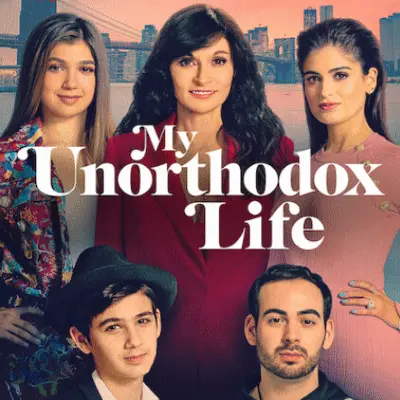Netflix’s My Unorthodox Life is more like a Bravo docusoap than an eye-opening docuseries
-

The newly released reality show that follows Julia Haart, the chief executive of modeling mega-brand Elite World Group, less than a decade after she left a repressive ultra-Orthodox Jewish community, tells its unique story "wrapped in the shiny, same-y packaging of a standard docusoap," says Judy Berman. "Ultra-Orthodox Judaism is so hot right now," says Judy Berman. "Although the inner workings of cloistered, fundamentalist communities have always been a source of pop-cultural curiosity, the past several years have seen an explosion in high-profile Haredi media," says Berman. "First came the mid-2010s raft of ex-Orthodox memoirs, from Leah Vincent’s Cut Me Loose to Elissa Altman’s Treyf. In 2017, as Disobedience cast Rachel Weisz and Rachel McAdams as ultra-Orthodox lovers, Netflix unveiled One of Us, a harrowing documentary about ex-Hasidic Jews. Along with Shtisel, a recently revived Israeli series that follows a frum family, the doc paved the way for a third Netflix project: last year’s emotional miniseries Unorthodox, which, drawing on Deborah Feldman’s widely read memoir of the same name, stars Shtisel standout Shira Haas as a young wife who flees Hasidic Brooklyn. These are, for the most part, tales of trauma, abuse and repression, culminating in hard-won liberation. Their tone tends to be somber, then triumphant. But no mass-media trend stays earnest forever. Now Netflix, like Eve in the Garden of Eden, has finally seized the low-hanging fruit—and it’s a juicy one. My Unorthodox Life, whose nine-episode first season just arrived on the service, is yet another story of an irrepressible woman escaping her ultra-Orthodox prison. Instead of an eye-opening docuseries or a tear-jerking drama, it’s a reality show in the glossy, soapy Bravo mold. While I’m sure it makes perfect sense to the algorithm, the result is an exceedingly strange, questionably authentic mix of moods, genre conventions and contrivances."
ALSO:
- My Unorthodox Life is compelling TV that could make life more dangerous for some Jewish people: "Haart is incredible—funny and feminist and, apparently, a very successful businesswoman," says Jenny Singer. "She and her four children feel like a new generation of Kardashians, but more substantive. Like that family, Haart’s clan is telegenic, with the rare alchemical skill of turning the mundane (eating salad, doing paid Instagram promotions) into high drama. They wear five-inch heels as they walk the line between ambition and entitlement. But the show works overtime to paint ultra-Orthodox Jews as extremists, as evil people...It’s true that some practices of more Orthodox Jews would be morally reprehensible to many of us. But watching and judging them on TV isn’t activism. Haart’s anger is justifiable, and in parts of the show she and her family engage in beautifully nuanced conversations about Judaism and feminism. (By the way, Haart would still be reality TV gold with less focus on Monsey and more focus on every other part of her life.) But the show pushes one message: Ultra-Orthodox Jews are dangerous."
- Why Julia Haart agreed to star in a reality show: "Until I became creative director of La Perla, I didn’t tell a single soul anything about my past," she says. "Zero. Like, if guys would ask about my past, I would literally make (expletive) up. I didn’t want people to know my story. I didn’t want to be a victim. But after my first collection, I thought, I’ve accomplished a little something. I had come to a place of personal comfort. And I hoped that someone would watch this and say, OK, if this crazy bitch did it, I can do it."
- Even before the premiere, Haart began receiving a flood of grateful social media messages from women who’ve been through similar ordeals
TOPICS: My Unorthodox Life, Netflix, Julia Haart, Reality TV
More My Unorthodox Life on Primetimer:- My Unorthodox Life Season 2 Is a Master Class in Spin
- TV Today: Slow Horses, Riches, and George & Tammy Bring the Drama
- The View Misses an Opportunity to Ask Julia Haart About Being Fired From Elite World Group
- My Unorthodox Life star Julia Haart's estranged husband accuses her of “illegally” withdrawing $850,000 from their company account
